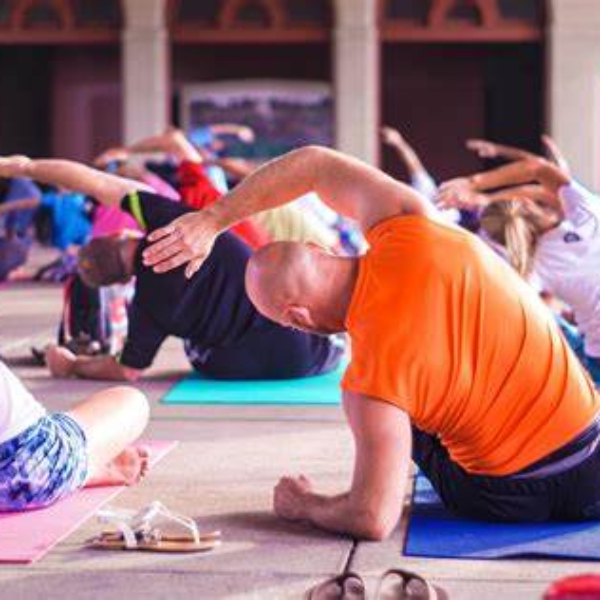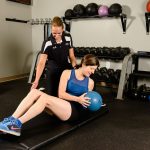The Misconception of Fitness Fads
In the quest for physical fitness, many fall prey to popular misconceptions. Fitness fads often come with bold promises, yet they lack definitive results. Understanding which factors are truly essential to physical fitness is critical. It’s easy to get swayed by glossy advertising and celebrity endorsements. However, not all fitness trends contribute to our goals. Fads focus on fleeting results and not on lifelong health.

One common myth suggests that to achieve good physical fitness, one must always follow the latest exercise regimes or diet crazes. Yet, consistency in routines and balanced nutrition outweighs any ‘cutting-edge’ method. Another misconception is that complex workouts lead to better outcomes. In reality, simple, proven exercises can be just as effective, if not more so. It’s not the complexity but the commitment and proper form that count.
It’s important to pose the question, ‘which of the factors below is not critical in developing good physical fitness?’ when evaluating a fitness fad. Many will not stand up to scrutiny. For example, gadgets claiming to ‘blast fat’ in minutes a day understate the importance of diet and regular activity. So, beware of fitness fads and focus on the fundamentals of exercise: stamina, strength, flexibility, and a healthy diet. Many gimmicks oversimplify fitness, leading to misconceptions about which is a common barrier to good fitness—neglecting a balanced diet and consistent exercise.
The Truth About Supplements and Physical Fitness
Supplements are common in the fitness world. Many see them as a quick fix for health and strength gains. However, supplements are not the deciding factor for good physical fitness. Our bodies need balanced nutrition from a variety of foods. This means getting vitamins, minerals, and protein from natural sources first.
Some think they need high amounts of protein powders to build muscle. But proper food choices can meet most nutritional needs. Supplements should be that—an addition to, not the base of, a diet. Furthermore, there’s no magic pill for fitness. Hard work, dedication, and planned exercise matter more.
So, think again when you ask, ‘which of the factors below is not critical in developing good physical fitness?’ Supplements might help fill gaps. They do not replace the fundamentals: a varied diet, consistent workouts, and rest. Keep focus on these key factors for true health and fitness progress. When considering your fitness journey, remember supplements can’t replace the essentials, like a varied diet and consistent workouts; but knowing how much an LA Fitness membership costs can help you get started.
Role of Genetics in Physical Fitness: Not as Critical as You Think
The role of genetics in physical fitness often sparks heated debates. Some insist genes dictate fitness levels. However, while genetics can influence physical attributes, their impact is not as decisive as many believe. In answering the question, ‘which of the factors below is not critical in developing good physical fitness?’, genes are surprisingly not at the top of the list.
Genetics do play a role in muscle composition, aerobic capacity, and body type. But these are starting points, not end goals. It’s not a genetic destiny that matters, but how you use what you have. Hard work, smart training, and a healthy lifestyle often outweigh genetic predispositions.
Here’s the truth: top athletes may have good genes, but without consistent training, their potential remains untapped. The same goes for anyone. Even if you lack ‘athletic’ genes, you can certainly improve your fitness significantly. Dedication to training, eating well, and rest trumps genetic limits.
Consider two people, one genetically ‘gifted’ and the other not. If the latter trains regularly and maintains healthy habits, they may very well outperform the former who doesn’t put in the effort. Moreover, with advancements in sports science and nutrition knowledge, overcoming genetic limitations is more feasible than ever.
Remember, asking ‘which of the factors below is not critical in developing good physical fitness?’—genetics is less essential than you might think. Your attitude, approach to fitness, and commitment are much more influential in your journey to physical well-being.
Expensive Gear and Gadgets: Do They Really Matter?
When exploring the question: ‘which of the factors below is not critical in developing good physical fitness?’ we ought to examine the relevance of high-priced fitness gear and gadgets. Do they play a pivotal role in achieving fitness goals, or are they merely luxurious extras?
Firstly, let’s consider basics such as a pair of sneakers or a yoga mat. While quality does matter to some extent, it doesn’t need to break the bank. A comfortable and durable pair of shoes can be just as effective as the latest expensive model endorsed by a sports celebrity. As for fitness gadgets promising to transform your workout, the truth is simpler. No gadget can replace the key elements of fitness: regular exercise, correct form, and a sustainable routine.

Furthermore, wearable technology, though useful for tracking progress, is not a prerequisite for success. These devices may provide data on steps taken or calories burned, but they don’t actually improve fitness. It’s the consistent physical activity that leads to better health, not the act of recording it.
The effect of luxurious gym memberships on your fitness journey is also worth mentioning. A pricier gym doesn’t guarantee a fitter body. What counts is how you use the facilities, regardless of cost. Even a basic gym setup or home workouts can lead to great results if used wit h dedication and proper technique.
In conclusion, expensive gear and gadgets are not among the critical factors for good physical fitness. Although they might enhance your experience or motivation, they’re not essential. Remember, investing in effort and discipline yields better and more sustainable results than any high-end equipment could ever promise.
The Reality of Body Types in Fitness Progress
Have you ever asked yourself, ‘which of the factors below is not critical in developing good physical fitness?’ when looking in the mirror? Body types are often blamed for fitness plateaus or unattained goals. It’s common to hear that someone’s build determines their fitness success. But this is far from the full story.
Everyone has a unique body type. Whether ectomorph, mesomorph, or endomorph, each has its characteristics. Ectomorphs are often lean and find gaining muscle challenging. Mesomorphs typically build muscle with ease and have a naturally athletic structure. Endomorphs store fat more readily and may find it hard to lose weight.
Despite these tendencies, body type does not seal your fitness fate. Fitness progress requires commitment, regardless of shape. It involves setting realistic goals, maintaining a consistent workout regime, and adopting a balanced diet. For example, an ectomorph can increase strength with the right training and nutrition. Similarly, an endomorph can achieve weight loss with dedication and appropriate lifestyle changes.
Effective fitness plans cater to individual body types but don’t limit potential. Tailoring a workout to your body type can help. Yet, it’s not a critical factor in the grand scheme of physical fitness. Anyone can improve their fitness level. It’s about the effort and strategy, not just the body you start with.
To conclude, body types might influence your strategy but should not dictate your ability to succeed in fitness. Instead of focusing on the body type you have, concentrate on nurturing good habits that will lead to progress and overall health.
The Impact of Age on Physical Fitness: Debunking the Myths
When questioning ‘which of the factors below is not critical in developing good physical fitness?’, age often surfaces as a concern. Many associate aging with a decline in physical capabilities. While age can have an impact, it’s not a barrier to achieving fitness goals.
It’s vital to bust the myth that age dictates fitness potential. Older adults can maintain or even improve their strength and stamina with regular exercise. The key is to adapt workouts to changing abilities and to focus on what is achievable.
Sure, the young may bounce back quicker from intense workouts. Yet, older individuals can still engage in a variety of exercises. Activities like walking, swimming, or yoga are beneficial and less taxing on the joints. Strength training can be tailored with lighter weights and more repetitions to protect against muscle loss.
Consistent physical activity is crucial, regardless of age. It boosts energy, helps maintain independence and enhances overall well-being. So, don’t let age dissuade you from pursuing fitness. The body can adapt at any age, provided you give it the right care and attention.
In conclusion, the myth that age is a decisive factor in physical fitness has been debunked. Youth may afford natural vitality, but age brings wisdom to train smarter. Dedication to active living is timeless and should be embraced at every stage of life.
Weather and Climate: Non-Determinants of Fitness Success
When answering the question, ‘which of the factors below is not critical in developing good physical fitness?’, weather and climate often enter the discussion. Some believe that extreme temperatures can hinder fitness goals. However, they are not as impactful as you might think.

For instance, regardless of heat or cold, indoor facilities provide a stable environment for exercise. A gym with air conditioning negates the summer heat, just as heating does the winter chill. Moreover, adapting to outdoor conditions can even strengthen your body and resolve.
Running in the heat with proper hydration and protection trains endurance. Similarly, exercising in cold conditions can increase metabolic rate. It’s about preparation and safety, not the climate itself.
Inhabitants of all climates achieve fitness, from Scandinavian cross-country skiers to Kenyan marathon runners. They succeed not just due to favorable weather, but because of resilience and tailored training.
Weather and climate pose challenges but not insurmountable barriers. You can stay active with home workouts during a storm or heatwave. Also, exploring indoor sports like swimming or basketball is an option.
The belief that climate is a critical factor is a myth. Access to appropriate facilities and determination are what truly matter in fitness. Fitness success is about consistent effort, not where you live or the season.
The Overemphasis on Specific Diets for Fitness
In discussions about physical fitness, diet often takes the spotlight. Many believe that without following a specific diet plan, fitness goals are unreachable. Let’s clear the air: no particular diet is a golden ticket to fitness success. Here’s why the emphasis on rigid diets may be misguided. While diet plays a role in fitness, understanding how much LA Fitness costs a month can also impact your ability to reach your fitness goals effectively.
Diverse nutritional needs are essential. Different bodies require different fuel. There is no one-size-fits-all meal plan. It is more about balanced, varied intake than a strict regimen.
The myth that you must cut out entire food groups is unhelpful. It’s about moderation, not elimination. The body needs carbohydrates, fats, and proteins to function well.
Sustainability is key. A diet should be realistic and maintainable long-term. Extreme diets can lead to yo-yo dieting, which is detrimental to overall health.
Adapting to individual lifestyles matters. A single diet cannot suit every person’s work, sleep, and stress levels.
What does make a difference? Consistent wholesome choices do. Eating fresh fruits, vegetables, lean meats, and whole grains contributes to good health.
So, when considering ‘which of the factors below is not critical in developing good physical fitness?’ specific diets are less important than once thought. Instead, focus on creating a balanced diet that is enjoyable and fits your life. That’s the true recipe for fitness success.

